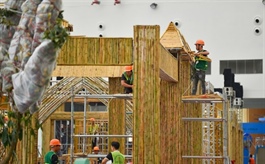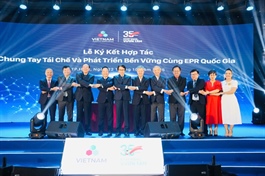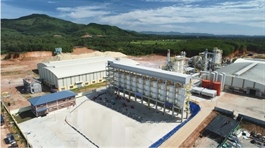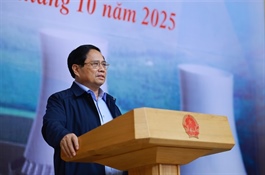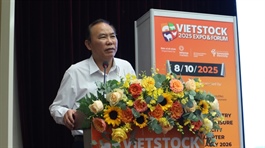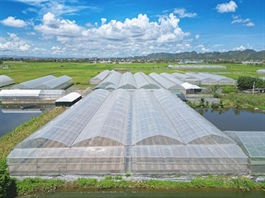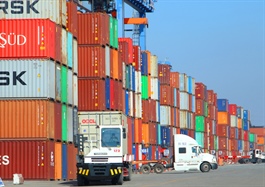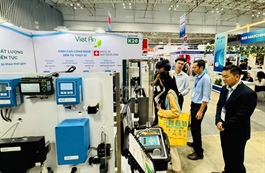Hanoi to shape and develop semiconductor industry
Hanoi to shape and develop semiconductor industry
Leveraging its strengths in human resource development and innovation, Hanoi is well-positioned to become the nucleus for Vietnam on the global semiconductor map.
On October 22, Hanoi Department of Science and Technology held a seminar titled “Positioning Vietnam in the Global Semiconductor Supply Chain: Key Criteria, Leading Powers, Vietnam’s Path, and Hanoi’s Vision.”
The event sought to discuss and shape strategic solutions for developing the semiconductor industry, widely regarded as the “infrastructure of infrastructures” in the digital era, thereby defining Hanoi’s role and vision in the regional and global semiconductor ecosystem.
Truong Viet Dung, Vice Chairman of Hanoi People’s Committee, noted that the city has witnessed remarkable progress, ranking first nationwide in both the innovation index and the provincial digital transformation index.
“Recently, Hanoi People’s Council approved six resolutions on science and technology development, innovation, and national digital transformation. Hanoi has clearly defined its vision and mission to lead in these fields,” Dung noted.
He further highlighted that the city allocates 4 per cent of its budget to science and technology, higher than the national average of 3 per cent, demonstrating its strong commitment.
“All spending on science, technology, and innovation follows the principle of accuracy and efficiency,” he said, adding that Hanoi has proposed practical implementation models under Resolution No.57/NQ-TW, such as pilot programmes addressing citizens’ pain points, and smart hospitals applying AI-first models.
In his opening remarks, Tran Anh Tuan, director of Hanoi Department of Science and Technology, reaffirmed that Hanoi has been entrusted with the mission to lead the nation in science, technology, innovation, and digital transformation.
“The city’s Steering Committee for implementing Resolution 57 constantly explores new ways to meet the expectations set by the Party and the government. One priority is mastering core technologies, such as semiconductors and chips, to create higher added value and drive Hanoi’s economic growth,” he said, emphasising the need for collaboration with experts, scientists, and enterprises.
|
Tran Anh Tuan, director of Hanoi Department of Science and Technology |
In practice, Hanoi aims to transform Hoa Lac into Vietnam’s Silicon Valley, focusing on semiconductor applications, AI research and development, and chip and the Internet of Things (IoT) design for smart agriculture. By 2030, Hoa Lac is expected to attract $10 billion in investment, with around 30 per cent coming from foreign-invested enterprises in the semiconductor industry.
Hanoi’s strategic location near Hoa Lac High-Tech Park strengthens its appeal to both domestic and foreign investors.
According to Prof. Nong Duc Ke, director of the Asian Institute of Advanced Technology, the key for Hanoi and Vietnam to advance in the semiconductor race lies in correctly positioning themselves within the global value chain.
He noted that lessons from leading US technology corporations show that the semiconductor industry requires cutting-edge expertise and massive capital investment, often in the tens of billions of dollars.
“Developing a semiconductor industry is beyond the capacity of any single locality. Vietnam therefore needs a comprehensive national strategy grounded in the spirit of play, pay, and share, which means daring to join the global game, willing to invest significantly, and open to cooperation and knowledge sharing,” he said.
|
Overview of the seminar |
From a business perspective, Dr. Ngo Dac Thuan, chairman of IP Group, stressed that to build a true semiconductor hub, Hanoi must simultaneously focus on human resource training, intellectual property development, technology incubation, research commercialisation, and high-tech startup support.
“Instead of training 100 per cent of engineers for chip design, Hanoi should adopt a balanced approach: 30 per cent specialising in design, 40 per cent involved in production processes, and 30 per cent focusing on packaging and testing,” suggested Thuan.
A representative from the Viettel Semiconductor Centre added that the company has spent six years researching and designing chips, including 5G SIM and telecom chips currently under testing.
“Within Vietnam’s national semiconductor strategy, Hanoi should capitalise on its strong engineering education system, anchored by leading universities such as the Hanoi University of Science and Technology, University of Engineering and Technology, and FPT University. This foundation can make the capital the nation’s leading semiconductor design and training hub,” he added.
- 17:26 23/10/2025



